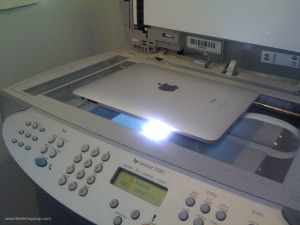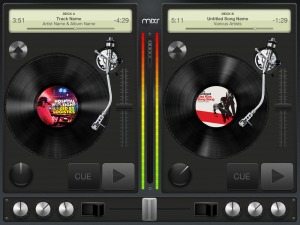Thursday, April 22, 2010
Wednesday, April 21, 2010
Block based destruction of HTML5 video
Tuesday, April 20, 2010
An SEO Infographic

An SEO Infographic

Saturday, April 17, 2010
Friday, April 16, 2010
Why the iPad is Important
 Apple's iPad is going to change computing as we currently know it. There I said it. As you know, iCrossing is a digital agency, and we have our fair share of Apple fans and detractors. For the last year or so there has been an almost continuous internal discussion around Apple's iPad. What it would be like, what features it would have (or not have), when it would be available, and what its impact would be. To some, the iPad is just a big iPod or iPhone. I'm thinking that in a few months, everyone will think of an iPod as a small iPad; it'll have that much impact. Some folks agree with me, some people think it's nothing special, and some think it'll be a failure. "Have you used one, Matt?" you ask. No, although I'd like to have one today, I'm waiting on a 3G iPad. Even before I ever touch it, however, I know the iPad will be revolutionary. Here are four reasons why:
Apple's iPad is going to change computing as we currently know it. There I said it. As you know, iCrossing is a digital agency, and we have our fair share of Apple fans and detractors. For the last year or so there has been an almost continuous internal discussion around Apple's iPad. What it would be like, what features it would have (or not have), when it would be available, and what its impact would be. To some, the iPad is just a big iPod or iPhone. I'm thinking that in a few months, everyone will think of an iPod as a small iPad; it'll have that much impact. Some folks agree with me, some people think it's nothing special, and some think it'll be a failure. "Have you used one, Matt?" you ask. No, although I'd like to have one today, I'm waiting on a 3G iPad. Even before I ever touch it, however, I know the iPad will be revolutionary. Here are four reasons why:
1. It was designed, from the beginning, to be a multi-touch device. While other attempts at a tablet were based on existing OSes with touch capabilities poorly grafted on, or required the use of a pen, or were simply laptops with a touch-screen, the iPad runs an operating system designed from the ground up for human touch input. This important distinction, plus Apple's dedication to the platform, such as their willingness to redesign existing Mac OS X applications - like iWork - to take full advantage of the iPad's touch interface is what it takes to ensure the iPad's success.
2. Apple understands user experience and knows how to translate that understanding into software. Putting aside the Mac vs. PC debate, there is no denying that Apple, previously a non-player in the mobile industry, changed it forever because the iPhone delivered on all of the hype surrounding it. The iPhone was slick, innovative, and its interface blew away everything else that was available at the time. It wasn't that other phones didn't have the same exact features as the iPhone - they did - it's just that the iPhone's user experience was far superior. You didn't need a manual to use it and you didn't have to explain it to anyone; it was simple, intuitive, and (except for the AT&T service) just worked. Apple also understands that less is more. Apple isn't trying to make the iPad everything to everyone; that would be a recipe for disaster. The iPad is a razor-sharp media scalpel. While the iPad won't do every single thing a laptop will do, the things it will do, it'll do amazingly well.
3. It has a solid, thriving and growing eco-system available now. The iPad has access to the entire eco-system developed around the iPod and iPad. Not just iTunes, which makes the purchasing and managing music and video almost too simple, not just the 150,000+ apps in the AppStore, most of which will work on the iPad with no change and at no additional cost(!), not just Mobile Safari which essentially means that anyone can build an "app" for the iPad, but also all of the manufacturers that have years of experience building accessories for the iPod and iPhone, that will start to churn out iPad accessories. Maybe Apple even has something up their sleeve for the AppleTV. Who knows?
And it must be said that Apple has fundamentally changed the way users think about micro-payments and the way that software publishers think about software pricing. Think about it: prior to the iPod and iPhone, the thought of paying $2 for an application for your phone would've been absurd, and the thought of a software publisher offering that app for only $2 was even crazier. Now no one even thinks twice about it. That folks, is called a paradigm shift, and it was critical to the success of Apple's platform.
4 . It's the right time. Apple waited, they watched, they learned, then they waited some more. They let the blogs, fans and haters hype/talk/trash the iTablet/iSlate/iPad, while they continued to work on the device in secrecy. It had to be perfect and it had to be the exact right time. And, it doesn't hurt that the economy seems to be picking up a bit of steam. I think they nailed it.
Okay, so let's say you buy into what I'm saying. "You're still describing a big iPod" you say. Let's talk about the future. Putting aside the obvious app wins, such as audio, video, and most of the existing AppStore catalog, let's explore some of the ways that the iPad will redefine computing, foster and drive innovation, and change everything. I'll even put aside gaming, which I promise you, will be one of the major forces driving the iPad's adoption and success. I'll highlight just four areas in no particular order, but really the scope is limited only by your imagination:
Education: Huge. Imagine being able to carry all of your books, reference material, note-taking application, audio recorder (to archive and then transcribe the lessons), plus your music, photos, and anything else you might need, in one device. Yes, a laptop can do all that, but here's what the iPad has that a laptop does not: a standardized connector. Imagine a table in a library with a row of built-in iPad dock connectors with keyboards. Now imagine that in the classroom with lessons streamed over wireless to the devices in the room. Or an Internet cafe. Or the dorm room. Or the laundromat. Or any service-oriented establishment wanting to entice a student with limited funds in need of a battery charge and some free WiFi.
The standard, ubiquitous connector, paired with a known - and locked down - platform, means that developers can create content that will play exactly the same on all iPads. Less is more. Speaking of which, as my co-worker Adam Lavelle has suggested, the iPad could herald a new way of consuming books for college students. What if students could buy only the chapter of the book that they needed for a course, instead of having to purchase the entire book? This would be trivial to accomplish on the iPad, and would completely disrupt an industry that's ripe for disruption. Awesome.
Health and Fitness: Think about walking into your local gym with your iPad, plugging it into the treadmill, elliptical, or even weight machine and having your workout driven by an app that has your physical history, can wirelessly re
ad realtime stats such as your heart rate, running pace, or number of reps. Think Nike+ (which I use) on steroids. When your workout is over, the app can show you how you did, let you review your workout, upload your stats, and plan your next workout.
Healthcare: Doctors are already leveraging the iPhone as a portable healthcare device, but the iPad's much larger screen will make new types of healthcare apps possible. What if the iPad geo-located which room it was in, wirelessly updating itself with the records of the patient that's closest to it, accessing charts, x-rays, test results, etc. Maybe that concept isn't exactly revolutionary, but what if medical companies started building diagnostic appliances that only had sensors, and came equipped with the iPad connector, utilizing the iPad as the display and/or software for the appliance, reducing the cost of the medical appliance, the operating cost to the hospital, and the cost of insurance coverage. Grandiose and overly simplistic idea, perhaps, but why dream small?
Sports: The iPad might be the device that finally blurs the line between jock and geek. MLB demoed their AtBat 2010 for iPad app during the launch of the iPad, and for baseball fans, it's amazing, but that's only the beginning, folks. ESPN, NFL, NBA, NHL will all have new experiences designed specifically for the iPad. Imagine what will happen when the leagues have the ability to bypass broadcast television networks and deliver programming directly to their fans. Of course, that's not going to happen over night; there are too many deals in place, and too much money is being made to dislodge the current system immediately, but the existence of the iPad will change broadcast TV, just like it's already changing the publishing industry.
The thing is, I'm truly just barely scratching the surface of the new generation of experiences that will be available on the iPad. All of the ideas that I've mentioned are doable now with the iPhone, but its screen just isn't up to the task. The iPad, however, is different. Finally, a true tablet, but what's more, a fully realized platform: a full-sized device with an OS purposefully built to intelligently handle multi-touch input, a super-fast processor, long battery life, full connectivity, a standardized connector, and a healthy eco-system to support it. Is it absolutely everything that I hoped it would be? Frankly, no. I'm still hoping that a front-facing camera model will be available in the near future. Will I be buying one anyway? YES!
Matt Schultz (@ByteEngine) is vice president of technology, product strategy for iCrossing.
Update 4/13/10: In the tradition of "Show, don't tell," I'll be posting some examples of how it'll change things:
Thursday, April 15, 2010
Thursday, April 8, 2010
iPad App Design
Damn, I love design.??Mixr via Landing Pad
Tuesday, April 6, 2010
Smoque BBQ!
Srsly. If you're in Chicago, you MUST try Smoque BBQ.








